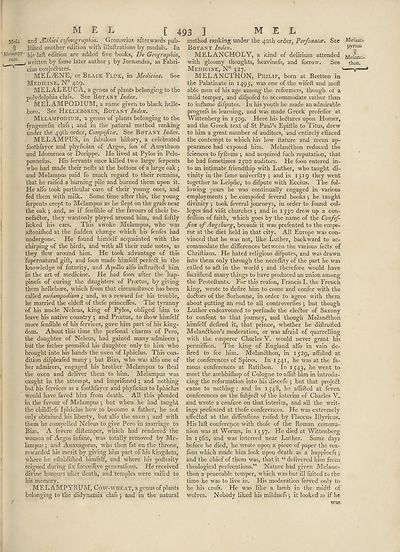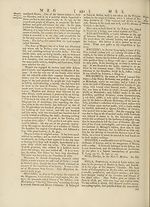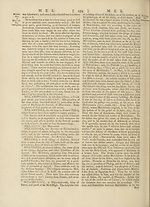Encyclopaedia Britannica, or, a Dictionary of arts, sciences, and miscellaneous literature : enlarged and improved. Illustrated with nearly six hundred engravings > Volume 13, MAT-MIC
(535) Page 493
Download files
Complete book:
Individual page:
Thumbnail gallery: Grid view | List view

M EL E 493 ] MEL
Mela and JEtfuci cofmographia. Gronovius afterwards pub-
11 lifhed another edition with iliuftrations by medals. In
"Melampy- laft edition are added five books, De Geographia,
rum‘ , written by fome later author j by Jornandes, as Fabri-
cius conjedtures.
MELiFiNE, or Black Flux, in Medicine. See
Medicine, N° 409.
MELALEUCA, a genus of plants belonging to the
polydelphia clafs. See Botany Index.
MEL AM PODIUM, a name given to black helle¬
bore. See Helleborus, Botany Index.
Melampodium, a genus of plants belonging to the
fyngenefia clafs ; and in the natural method ranking
under the 49th order, Compojitce. See Botany Index.
MELAMPUS, in fabulous hiftory, a celebrated
foothfayer and phyfician of Argos, fon of Amythaon
and Idomenea or Dorippe. He lived at Pylos in Pelo-
ponnefus. Elis fervants once killed two large ferpents
who had made their nefts at the bottom of a large oak ;
and Melampus paid fo much regard to their remains,
that he railed a burning pile and burned them upon it.
He alfo took particular care of their young ones, and
fed them with milk. Some time after this, the young
ferpents crept to Melampus as he flept on the grafs near
the oak j and, as if fenfible of the favours of their be-
nefadlor, they wantonly played around him, and foftly
licked his ears. This awoke Melampus, who was
aftonilhed at the iudden change which his fcnfes had
undergone. He found himfelf acquainted with the
chirping of the birds, and with all their rude notes, as
they flew around him. He took advantage of this
fupernatural gift, and foon made himfelf perfedl in the
knowledge of futurity, and Apollo alfo inftructed him
in the art of medicine. He had foon after the hap-
pinefs of curing the daughters of Proetus, by giving
them hellebore, which from that circumftance has been
called melampodium ; and, as a reward for his trouble,
he married the eldeft of thefe princefles. The tyranny
of his uncle Neleus, king of Pylos, obliged him to
leave his native country 5 and Proetus, to (how himfelf
more fenfible of his fervices, gave him part of his king¬
dom. About this time the perfonal charms of Pero,
the daughter of Neleus, had gained many admirers ;
but the father promifed his daughter only to him who
brought into his hands the oxen of Iphiclus. This con¬
dition difpleafed many 5 but Bias, who was alfo one of
her admirers, engaged his brother Melampus to fteal
the oxen and deliver them to him. Melampus was
caught in the attempt, and imprifoned ; and nothing
but his fervices as a foothfayer and phyfician to Iphiclus
would have faved him from death. All this pleaded
in the favour of Melampus ; but when he had taught
the cliildlefs Iphiclus how to become a father, he not
only obtained his liberty, but alfo the oxen ; and with
them he compelled Neleus to give Pero in marriage to
Bias. A fevere diftemper, which had rendered the
women of Argos infane, was totally removed by Me¬
lampus j and Anaxagoras, who then fat on the throne,
rewarded his merit by giving him part of his kingdom,
where he eftabliflied himfelf, and where his pofterity
reigned during fix fucceflive generations. He received
divine honours after death, and temples were raifed to
his memory.
MEL AMPYRUM, Cow-wheat, a genus of plants
belonging to the didynamia clafs j and in the natural
method ranking under the 40th order, Perfonata. See Meiam-
Botany Index. Py™111
MELANCHOLY, a Kind of delirium attended Melanc-
with gloomy thoughts, heavinefs, and forrow. See thon.
Medicine, N° 327. y—.
MELANCTHON, Philip, born at Bretten in
the Palatinate in 1495, was one of the wifefl and moll
able men of his age among the reformers, though of a
mild temper, and difpofed to accommodate rather than
to inflame difputes. In his youth he made an admirable
progrefs in learning, and was made Greek profeilbr at
Wittenberg in 1509. Here his lectures upon Homer,
and the Greek text of St Paul’s Epiltle to Titus, drew
to him a great number of auditors, and entirely effaced
the contempt to which his low ftature and mean ap¬
pearance had expoled him. Melanfthon reduced the
fciences to fyftems ; and acquired fuch reputation, that
he had fometimes 2500 auditors. He foon entered in¬
to an intimate friendfhip with Luther, who taught di¬
vinity in the fame univerfity •, and in 1519 they went
together to Leipfic, to difpute with Eccius. The fol¬
lowing years he was continually engaged in various
employments j he compofed feveral books j he taught
divinity j took feveral journeys, in order to found col¬
leges and vifit churches ; and in 1530 drew up a con-
feflion of faith, which goes by the name of the Confef-
Jion of Augsburg, becaufe it was prefented to the empe¬
ror at the diet held in that city. All Europe was con¬
vinced that he wras not, like Luther, backward to ac¬
commodate the differences between the various fe£!s of
Chriftians. He hated religious difputes, and was drawn
into them only through the neceflity of the part he Avas
called to a6! in the world 5 and therefore would have
facrificed many things to have produced an union among
the Proteftants. For this reafon, Francis I. the French
king, wrote to defire him to come and confer with the
doftors of the Sorbonne, in order to agree with them
about putting an end to all controverfies ; but though
Luther endeavoured to perfuade the eleftor of Saxony
to confent to that journey, and though Melan&hon
himfelf defired it, that prince, Avhether he diftrufled
Melancfhon’s moderation, or was afraid of quarrelling
with the emperor Charles V. would never grant his
permiflion. The king of England alfo in vain de¬
fired to fee him. Melandlhon, in 1529, aflifted at
the conferences of Spires. In 1541, he was at the fa¬
mous conferences at Ratifbon. In 1543, he went to
meet the archbifliop of Cologne to afiift him in introdu¬
cing the reformation into his diocefe ; but that projedt
came to nothing : and in 1 548, he aflifted at feven
conferences on the fubject of the interim of Charles V.
and wrote a cenfure on that interim, and all the wait¬
ings prefented at thefe conferences. He was extremely
affedted at the diflenfions raifed by Flaccus Illyricus.
His laft conference with thofe of the Roman commu¬
nion was at Worms, in 1557. He died at Wittenberg
in 1560, and was interred near Luther. Some days
before he died, he wrote upon a piece of paper the rea-
fons which made him look upon death as a happinefs j
and the chief of them was, that it “ delivered him from
theological perfeculions.” Nature had given Melanc-
thon a peaceable temper, which wras but ill fuited to the
time he was to live in. His moderation ferved only to
be his crofs. He was like a lamb in the midft of
wulves. Nobody liked his mildnefj j it looked as if he
was
Mela and JEtfuci cofmographia. Gronovius afterwards pub-
11 lifhed another edition with iliuftrations by medals. In
"Melampy- laft edition are added five books, De Geographia,
rum‘ , written by fome later author j by Jornandes, as Fabri-
cius conjedtures.
MELiFiNE, or Black Flux, in Medicine. See
Medicine, N° 409.
MELALEUCA, a genus of plants belonging to the
polydelphia clafs. See Botany Index.
MEL AM PODIUM, a name given to black helle¬
bore. See Helleborus, Botany Index.
Melampodium, a genus of plants belonging to the
fyngenefia clafs ; and in the natural method ranking
under the 49th order, Compojitce. See Botany Index.
MELAMPUS, in fabulous hiftory, a celebrated
foothfayer and phyfician of Argos, fon of Amythaon
and Idomenea or Dorippe. He lived at Pylos in Pelo-
ponnefus. Elis fervants once killed two large ferpents
who had made their nefts at the bottom of a large oak ;
and Melampus paid fo much regard to their remains,
that he railed a burning pile and burned them upon it.
He alfo took particular care of their young ones, and
fed them with milk. Some time after this, the young
ferpents crept to Melampus as he flept on the grafs near
the oak j and, as if fenfible of the favours of their be-
nefadlor, they wantonly played around him, and foftly
licked his ears. This awoke Melampus, who was
aftonilhed at the iudden change which his fcnfes had
undergone. He found himfelf acquainted with the
chirping of the birds, and with all their rude notes, as
they flew around him. He took advantage of this
fupernatural gift, and foon made himfelf perfedl in the
knowledge of futurity, and Apollo alfo inftructed him
in the art of medicine. He had foon after the hap-
pinefs of curing the daughters of Proetus, by giving
them hellebore, which from that circumftance has been
called melampodium ; and, as a reward for his trouble,
he married the eldeft of thefe princefles. The tyranny
of his uncle Neleus, king of Pylos, obliged him to
leave his native country 5 and Proetus, to (how himfelf
more fenfible of his fervices, gave him part of his king¬
dom. About this time the perfonal charms of Pero,
the daughter of Neleus, had gained many admirers ;
but the father promifed his daughter only to him who
brought into his hands the oxen of Iphiclus. This con¬
dition difpleafed many 5 but Bias, who was alfo one of
her admirers, engaged his brother Melampus to fteal
the oxen and deliver them to him. Melampus was
caught in the attempt, and imprifoned ; and nothing
but his fervices as a foothfayer and phyfician to Iphiclus
would have faved him from death. All this pleaded
in the favour of Melampus ; but when he had taught
the cliildlefs Iphiclus how to become a father, he not
only obtained his liberty, but alfo the oxen ; and with
them he compelled Neleus to give Pero in marriage to
Bias. A fevere diftemper, which had rendered the
women of Argos infane, was totally removed by Me¬
lampus j and Anaxagoras, who then fat on the throne,
rewarded his merit by giving him part of his kingdom,
where he eftabliflied himfelf, and where his pofterity
reigned during fix fucceflive generations. He received
divine honours after death, and temples were raifed to
his memory.
MEL AMPYRUM, Cow-wheat, a genus of plants
belonging to the didynamia clafs j and in the natural
method ranking under the 40th order, Perfonata. See Meiam-
Botany Index. Py™111
MELANCHOLY, a Kind of delirium attended Melanc-
with gloomy thoughts, heavinefs, and forrow. See thon.
Medicine, N° 327. y—.
MELANCTHON, Philip, born at Bretten in
the Palatinate in 1495, was one of the wifefl and moll
able men of his age among the reformers, though of a
mild temper, and difpofed to accommodate rather than
to inflame difputes. In his youth he made an admirable
progrefs in learning, and was made Greek profeilbr at
Wittenberg in 1509. Here his lectures upon Homer,
and the Greek text of St Paul’s Epiltle to Titus, drew
to him a great number of auditors, and entirely effaced
the contempt to which his low ftature and mean ap¬
pearance had expoled him. Melanfthon reduced the
fciences to fyftems ; and acquired fuch reputation, that
he had fometimes 2500 auditors. He foon entered in¬
to an intimate friendfhip with Luther, who taught di¬
vinity in the fame univerfity •, and in 1519 they went
together to Leipfic, to difpute with Eccius. The fol¬
lowing years he was continually engaged in various
employments j he compofed feveral books j he taught
divinity j took feveral journeys, in order to found col¬
leges and vifit churches ; and in 1530 drew up a con-
feflion of faith, which goes by the name of the Confef-
Jion of Augsburg, becaufe it was prefented to the empe¬
ror at the diet held in that city. All Europe was con¬
vinced that he wras not, like Luther, backward to ac¬
commodate the differences between the various fe£!s of
Chriftians. He hated religious difputes, and was drawn
into them only through the neceflity of the part he Avas
called to a6! in the world 5 and therefore would have
facrificed many things to have produced an union among
the Proteftants. For this reafon, Francis I. the French
king, wrote to defire him to come and confer with the
doftors of the Sorbonne, in order to agree with them
about putting an end to all controverfies ; but though
Luther endeavoured to perfuade the eleftor of Saxony
to confent to that journey, and though Melan&hon
himfelf defired it, that prince, Avhether he diftrufled
Melancfhon’s moderation, or was afraid of quarrelling
with the emperor Charles V. would never grant his
permiflion. The king of England alfo in vain de¬
fired to fee him. Melandlhon, in 1529, aflifted at
the conferences of Spires. In 1541, he was at the fa¬
mous conferences at Ratifbon. In 1543, he went to
meet the archbifliop of Cologne to afiift him in introdu¬
cing the reformation into his diocefe ; but that projedt
came to nothing : and in 1 548, he aflifted at feven
conferences on the fubject of the interim of Charles V.
and wrote a cenfure on that interim, and all the wait¬
ings prefented at thefe conferences. He was extremely
affedted at the diflenfions raifed by Flaccus Illyricus.
His laft conference with thofe of the Roman commu¬
nion was at Worms, in 1557. He died at Wittenberg
in 1560, and was interred near Luther. Some days
before he died, he wrote upon a piece of paper the rea-
fons which made him look upon death as a happinefs j
and the chief of them was, that it “ delivered him from
theological perfeculions.” Nature had given Melanc-
thon a peaceable temper, which wras but ill fuited to the
time he was to live in. His moderation ferved only to
be his crofs. He was like a lamb in the midft of
wulves. Nobody liked his mildnefj j it looked as if he
was
Set display mode to:
![]() Universal Viewer |
Universal Viewer | ![]() Mirador |
Large image | Transcription
Mirador |
Large image | Transcription
Images and transcriptions on this page, including medium image downloads, may be used under the Creative Commons Attribution 4.0 International Licence unless otherwise stated. ![]()
| Permanent URL | https://digital.nls.uk/192668117 |
|---|
| Attribution and copyright: |
|
|---|
| Description | Ten editions of 'Encyclopaedia Britannica', issued from 1768-1903, in 231 volumes. Originally issued in 100 weekly parts (3 volumes) between 1768 and 1771 by publishers: Colin Macfarquhar and Andrew Bell (Edinburgh); editor: William Smellie: engraver: Andrew Bell. Expanded editions in the 19th century featured more volumes and contributions from leading experts in their fields. Managed and published in Edinburgh up to the 9th edition (25 volumes, from 1875-1889); the 10th edition (1902-1903) re-issued the 9th edition, with 11 supplementary volumes. |
|---|---|
| Additional NLS resources: |
|

